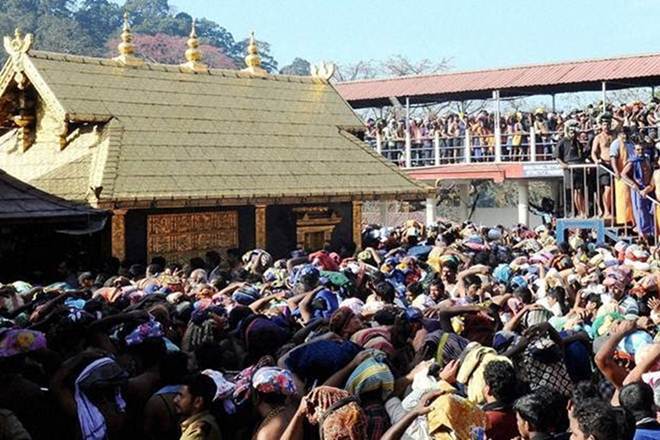Sabarimala verdict in Supreme Court Live Updates: The apex court today lifted the ban on the entry of women aged between 10 and 50 years into the Sabarimala temple in Kerala. The five-judge bench by 4:1 majority had opined that the custom of stopping women from entering the shrine is violative of Article 25(1). The lone woman member of the bench Justice Indu Malhotra has expressed dissenting opinion saying the court should not interfere in issues of deep religious sentiments.
Apart from Chief Justice of India Misra, the bench comprises Justices R F Nariman, A M Khanwilkar, D Y Chandrachud and Indu Malhotra. The bench had earlier said that the constitutional scheme prohibiting exclusion has “some value” in a “vibrant democracy”.
The pleas were filed by petitioners Indian Young Lawyers Association and others. The Kerala government has been changing its stand on the contentious issue of women of the menstrual age group entering the Sabarimala temple. It had on July 18 informed the Supreme Court that it now favoured their entry after having argued against it initially.


"Balance needs to be struck between relgious beliefs on one hand and cherished principles of non-discrimination and equality laid down by Constitution on the other," said Justice Indu Malhotra. "Respondents have made out a strong case for Ayyappa devotees being a separate denomination," she was quoted as saying by Bar & Bench.
Justice Malhotra the court should not interfere unless if there is any aggrieved person from that section or religion. "Notion of rationality should not be seen in matters of religion," Justice Malhotra said.
Justice Indu Malhotra has expressed dissenting opinion. She said that the court should not interfere in issues of deep religious sentiments. Justice Malhotra said Sabarimala temple and deity is protected by Article 25 of Constitution.
Devaswom board in Kerala, which provide funds the temple, has said that it won't file review petition in the Supreme Court, as per TV reports
"We will go for a review petition after getting support from other religious heads," Travancore Devaswom Board (TDB) president, A Padmakumar, was quoted as saying by ANI.
Justice Chandrachud said that ""Article 25 protects all persons, it means every individual in the society." He also observed "Religion cannot be cover to deny women right to worship. To treat women as children of lesser God is to blink at Constitutional morality" as per Bar & Bench.
Activist Rahul Easwar, who has defended the Sabarimala temple authority's decision to prohibit women from entering the shrine, has said that he will file a review petition.
Concurring with Chief Justice of India Dipak Misra, Justice Rohinton Nariman struck down The custom of barring women is violative of Article 25(1). Rule 3(b) of Kerala Hindu Places of Public Worship (Authorisation of Entry) Rules,1965
Chief Justice of India Dipak Misra has observed, "the bar on entry of women between age of 10 and 50 years is not an essential part of the religion". "Rule 3(b) of 1965 Rules is a clear violation of right of Hindu women to practice religion under Article 25," CJI Dipak Misra said.
Chief Justice of India Dipak Misra is reading out the verdict for himself and on behalf of J Khanwilkar. The lone woman member in the Supreme Court, Justice Indu Malhotra dissents with majority.
Kerala government had in 2015 had supported the entry of women. However, it had made a U-turn in 2017 and opposed the entry. The Kerala government again on July 18 told the Supreme Court that it was ready to favour the women's entry. "You are changing with the changing times," the bench remarked
On July 18, the top court had said women have the Constitutional right to enter Sabarimala temple. "When a man can enter, a woman can also go. What applies to a man, applies to a woman also," the top court said. "The right to enter a temple is not dependent on a legislation. It is the constitutional right," the SC bench said.
The bench, which also comprised Justices R F Nariman, A M Khanwilkar, D Y Chandrachud and Indu Malhotra, had earlier said that the constitutional scheme prohibiting exclusion has "some value" in a "vibrant democracy". The top court's verdict would deal with the petitions filed by petitioners Indian Young Lawyers Association and others.
The Kerala government has not remained fixed on its stand on the contentious issue. However, on July, it had said that it will back the entry of the women of the menstrual age group.
The Supreme Court had last year framed five "significant" questions. Among those one question pertained to whether banning entry of women into the temple in Kerala stood to discrimination and violated their fundamental rights under the Constitution.